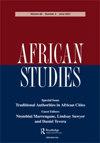Boer War
IF 1
4区 社会学
Q2 AREA STUDIES
引用次数: 0
Abstract
The Boer War of 1899–1902, also termed the Anglo-Boer War or South African War, was waged by Britain to establish its imperial supremacy in South Africa and by Boers/Afrikaners to defend their independent republican order and control of the destiny of the white settler states they had secured in the interior. Large, long, controversial and costly, the Boer War was a colonial conflict which finally completed the British imperial conquest of the Southern African region. As is to be expected of a war that has a widely recognized significance not only in the history of European imperialism in Southern Africa but in world history more generally, literature on the 1899–1902 conflict is, simply, enormous. Scholarship is available not merely in English and in Afrikaans, but also in Dutch, French, German, Russian, Spanish, and even in Japanese. As it happens, more recent decades have seen the publication of sizeable bibliographies covering a century of writings on the Boer War in German and in Dutch. Although it could obviously not be claimed that every aspect of the 1899–1902 period—military, political, economic, social, or cultural—has been treated, evenly or otherwise, by so vast a body of literature, the sheer quantity of work available has to influence the scope and selectivity of any Boer War bibliography of this kind. While this bibliographic article includes some seminal early pieces, it is weighted toward more recently works and, in particular, includes scholarship which contains detailed bibliographies covering aspects of warfare (battles, sieges) that are not a specific focus of the approach taken here. Secondly, other classifiable areas of historiography which fall beyond the limits of this article, such as war memory and commemoration, and postwar economic reconstruction and political state-making, are treated—in some instances, quite substantially—in single-author general overviews and in multi-author edited treatments. In other respects, this article goes beyond more conventional historical terrain in including the war’s literary and cultural influences.1899年至1902年的布尔战争,也被称为盎格鲁-布尔战争或南非战争,由英国发动,以建立其在南非的帝国霸权,布尔人/阿非利卡人发动,以捍卫他们独立的共和秩序,并控制他们在内陆获得的白人定居者国家的命运。布尔战争是一场大规模、漫长、有争议且代价高昂的殖民冲突,最终完成了英国帝国对南部非洲地区的征服。正如人们所期望的那样,这场战争不仅在欧洲帝国主义在南部非洲的历史上,而且在更广泛的世界历史上都具有广泛公认的意义,关于1899-1902年冲突的文献简直是巨大的。奖学金不仅有英语和南非荷兰语,还有荷兰语、法语、德语、俄语、西班牙语,甚至日语。碰巧的是,近几十年来,大量的书目以德语和荷兰语出版,涵盖了一个世纪以来关于布尔战争的著作。尽管显然不能说1899年至1902年期间的每一个方面——军事、政治、经济、社会或文化——都被如此庞大的文献所平等或以其他方式对待,但可用的作品数量之多必然会影响任何此类布尔战争书目的范围和选择性。虽然这篇书目文章包括一些开创性的早期作品,但它倾向于最近的作品,尤其是学术作品,其中包含了涵盖战争(战斗、围困)方面的详细书目,而这些方面并不是本文所采用方法的具体重点。其次,超出本文范围的其他可分类的史学领域,如战争记忆和纪念,战后经济重建和政治国家建设,在某些情况下,在单作者综述和多作者编辑的处理中得到了相当实质性的处理。在其他方面,本文超越了更传统的历史领域,纳入了战争的文学和文化影响。
本文章由计算机程序翻译,如有差异,请以英文原文为准。
求助全文
约1分钟内获得全文
求助全文

 求助内容:
求助内容: 应助结果提醒方式:
应助结果提醒方式:


